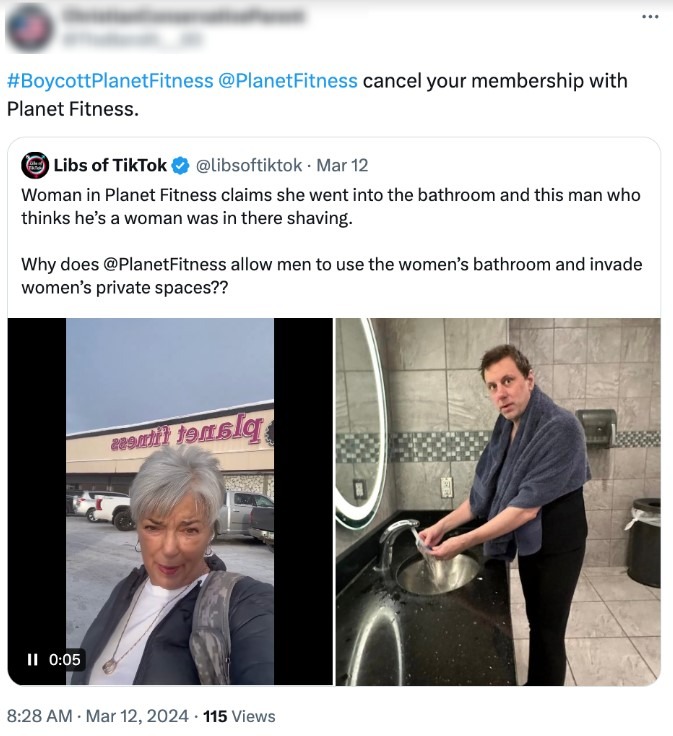Gym chain Planet Fitness found itself facing boycott calls on X for the gym’s handling of transgender rights issues after an incident in the women’s locker room.
Cyabra uncovered that 19% of the profiles that participated in this discussion using the viral hashtag #BoycottPlanetFitness on X were fake, and were responsible for spreading narratives that damaged the brand and reached the eyes of hundreds of millions.
In recent months, many major brands found themselves attacked by fake profiles on social media. Usually, those would be bot networks, latching onto a trending hashtag such as a call for a boycott to promote their own agendas and achieve virality. But in Planet Fitness’ case, the first use of the hashtag #BoycottPlanetFitness was made by a fake profile, displaying another concerning development in the ability of bad actors to manipulate social discourse and cause major harm to the reputation of companies.
TL;DR?
- The hashtag #BoycottPlanetFitness was created and launched by a fake profile.
- 19% of X (Twitter) profiles using the hashtag were fake.
- Fake profiles posts using the hashtag reached the potential eyes of over 200 million people.
Planet Fitness Faces Resistance
Planet Fitness has been facing mounting scrutiny as well as a major stock drop after canceling a woman’s membership for photographing a transgender using the women’s locker room.
The hashtag #BoycottPlanetFitness began trending in mid-March as profiles in the conversation expressed criticism toward Planet Fitness’s “judgment-free zone” policy, allowing members to use locker rooms matching their gender identity.
While fake profiles usually wait for a hashtag to start trending and then latch onto it to promote their agenda, this time, as is witnessed in the graph above, fake profiles were not only part of the conversation from the moment it started – they were the ones who started the fire.
Cyabra’s analysis found that the very first use of the hashtag #BoycottPlanetFitness, on March 15, came from a fake account. Further research into the profiles’ content and activity exhibited hallmarks of inauthenticity, including a high volume of content related to the upcoming US presidential elections.

The fake account used the hashtag while reposting content from the influential conservative account @libsoftiktok, which has 2.9M followers. Two days later, the hashtag circled back to the same account, who picked it up and called for its spread. Usage of the hashtag skyrocketed with both real and inauthentic accounts. The fake profiles posted thousands of times using this hashtag, reaching the potential eyes of 220,278,000 people.
During the following week, when it seemed like the trend had run its course, it resurfaced again with news of Planet Fitness’ stock plummeting, interviews with the woman whose membership was canceled, an old commercial that didn’t sit well with the company’s current values, and some previous cases related to gender issues. All those new bits were picked up and amplified by hundreds of fake accounts.

The Weight of Fake Profiles
The significant contributions of fake profiles to the #BoycottPlanetFitness conversations underscores how bots can amplify any crisis.
But here’s the real concerning issue: while in the past, bots would latch onto controversial issues only when they had started to trend, usually a day or two into the hashtag’s spread, this is the first occurrence in which Cyabra identified a fake profile that started the hashtag, effectively creating the negative campaign against Planet Fitness and promoting outrage towards the brand. This is a new radical step in the battlefront of authenticity on social media. Fake profiles no longer stand on the side and wait to jump on the polarization wagon. Now, they harness, stir, and drive the horses. And where they go, the trend, now promoted by hundreds of authentic profiles, follows.
With the rising threats of fake profiles and their growing capabilities of manipulating and controlling social discourse, companies must enhance their ability to identify and mitigate inauthentic accounts harming their reputation.
if you are responsible for managing the Planet Fitness brand, here are three things you could do:
- Identify any new fake accounts and take down the ones that are most damaging to the brand,
- Surface the narratives among the positive authentic profiles discussing the brand, and amplify their viewpoint,
- Turn on continuous monitoring to catch the next fake account looking to go viral while damaging your brand.
______________
If you’re interested in learning more about detecting fake profiles promoting their agendas in trending online discourse, contact Cyabra.


